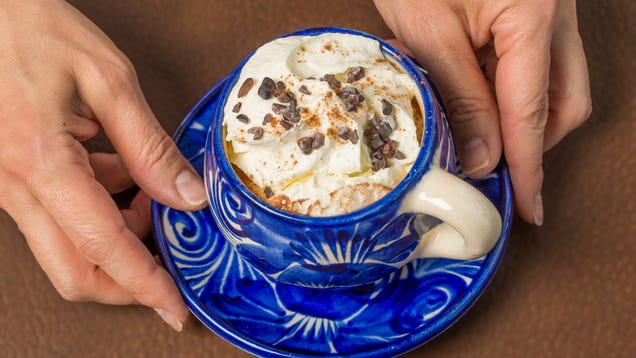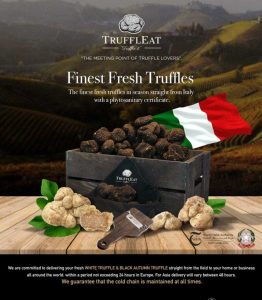“We’ve been consuming this food product for over 5,000 years,” Bonnie Bennett tells me from her shop in Santa Fe. “Many people don’t even know that chocolate has such a long, amazing history.”
She owns Kakawa Chocolate House with her husband, Tony Bennett (“just like the singer, but mine can’t sing,” Bonnie says). Since its founding in 2007, it’s been a business with a unique mission: to preserve—and serve—the history of chocolate in a cup.
“Ninety percent of its long history, when you look at it that way, has been as a beverage, not as an eating chocolate,” Bennett explains. “It’s an enormous amount of history that didn’t look anything like what most of us think when we think of chocolate today.”
Kakawa’s “elixirs,” as its hot chocolates are called, come from ancient recipes discovered through years of research. The Bennetts collaborated with other researchers to find those recipes and use them as the base for what they sell in their shops. “Kakawa” is from the Olmec civilization, which predates Mayan and Aztec civilizations; the word, Bennett says, is the earliest word for chocolate that we know.
“What we’ve done is basically built off of those initial ancient recipes,” Bennett says, and made versions as close to the originals as possible using present-day ingredients. Kakawa’s Mayan Spiced Chocolate and the Aztec Warrior elixirs, based on bitter chocolate beverages sacred to those civilizations, are made with 14 to 17 different herbs, spices, flowers, nuts, and chilis.
G/O Media may get a commission

33% off
Sobro Smart Coffee Table
The coffee table of the future.
It’s a coffee table with a fridge, high-quality Bluetooth speaker, LED lights, and plenty of outlets to spare.
“From there, we added a wealth of different recipes that sort of span history,” she adds. “We like to call it a little time travel for the palate… There are old European recipes that have all been researched, like the Italian Citrus from 1666, which was actually a recipe from the Medici family, and the Marie Antoinette, based on Marie Antoinette’s favorite sipping chocolate. She was a huge and fanatical chocolate lover.”
I first encountered Kakawa at its shop in Salem, Massachusetts, one of four locations and the only one outside New Mexico. I couldn’t pick just one variety, so I settled on a flight of drinking chocolates: Aztec Warrior, Mayan Full Spice, Marie Antoinette, and Thomas Jefferson.
As someone who loves to learn about ancient civilizations, I wanted to love the Mayan and Aztec elixirs. Unfortunately I just don’t have the palate for chili-spiced chocolate, but these drinks would absolutely appeal to those who do. I adored the Marie Antoinette, a 1775 recipe the queen brought to France from Vienna which makes use of orange blossom water, cinnamon, vanilla, and orange blossom oil. But my favorite was Thomas Jefferson’s 1790s elixir, which he first enjoyed in France and brought home to America, adding nutmeg and vanilla to his mixture.
Salem is a fitting place to serve a menu with close ties to the distant past. The city is, after all, best known as the site where 19 people were convicted of witchcraft and executed during the Salem Witch Trials of the late 17th century. That chapter of Masachusetts history, and many other milestones from across Salem’s 400 years, still hang in the air today. To sit in this spot and sip something from centuries ago is a unique experience, to say the least.
“A lot of people have said, ‘Why in the world, Salem?’” Bennett says. “The town fascinated us in terms of being a very different kind of history than we focus on in Santa Fe, but history nonetheless.”
In both cities, Kakawa uses as many local ingredients as possible. In Santa Fe, where Bennett and her husband live, the chocolates and truffles they make contain ingredients like chilis that “harken back to our historical roots.” Ingredients include New Mexico lavender, prickly pear, pine nuts, and the products of local distillers and winemakers.
“We’re really trying to carry some of those initial roots into all that we do,” says Bennett, adding that Kakawa holds “chocolate immersion” experiences that provide a lesson in the history of chocolate (and tastings, of course). For Kakawa’s founders, it’s important to create a relationship to foods that were being consumed thousands of years ago.
“To me that’s just a thread that we’re missing in so much of our culture today,” she says. “We don’t tend to look back that far and understand how related and tied to history we are. To me, this is where you taste it.”

